- Home
- Francine Rivers
Unafraid_Mary
Unafraid_Mary Read online
UNAFRAID
Francine Rivers
T Y N D A L E H O U S E P U B L I S H E R S , I N C .
W H E A T O N , I L L I N O I S
Visit Tyndale's exciting Web site at www.tyndale.com
Check out the latest about Francine Rivers at www.francinerivers.com
Copyright © 2001 by Francine Rivers. All rights reserved.
“Seek and Find” section written by Peggy Lynch.
Cover illustration copyright © 2001 by Vivienne Flesher. All rights reserved.
Author's photo copyright © 1999 by John Teague. All rights reserved.
Edited by Kathryn S. Olson
Designed by Julie Chen
Scripture quotations are taken from the Holy Bible, New Living Translation, copyright © 1996. Used by permission of Tyndale House Publishers, Inc., Wheaton, Illinois 60189. All rights reserved.
* * *
Library of Congress Cataloging-in-Publication Data
Rivers, Francine, date.
Unafraid / Francine Rivers.
p. cm. — (Lineage of grace)
ISBN 1-4143-0481-1
1. Tamar, daughter-in-law of Judah—Fiction. 2. Rahab (Biblical figure)—Fiction. 3. Ruth (Biblical figure)—Fiction. 4. Bathsheba (Biblical figure)—Fiction. 5. Mary, Blessed Virgin, Saint—Fiction.
6. Bible—History of Biblical events—Fiction. 7. Women in the Bible—Fiction. I. Title.
PS3568.I83165 U43 2001
813'.54—dc21 2001003093
* * *
This novella is dedicated to Jane Jordan Browne, a woman of faith.
Rick, thank you for our prayer time and talks in the morning before the sun comes up. Those times are precious to me and set the tone for the rest of the day. Thank you also for sharing your office, building the fire on cold mornings, brewing the coffee, and pausing in your own hectic business schedule to spend time listening.
Thank you, Jane Jordan Browne, for your constant encouragement and friendship through the years. I've always been able to depend on you.
Scott Mendel, thank you for your continuing assistance. During the course of writing the five novellas, many questions arose. You were always quick to respond with valuable information.
Jeffrey Essmann, thank you for sharing historical information, lists of resources, Web sites, and insights on Mary.
Thank you, Peggy Lynch, my dear friend and sister in Christ. You have been a blessing to me from the day I met you. You have always held up the lamp of God's Word, and your life continues to be a living testimony of faith. I know the Bible studies you've written to accompany these novellas will be a blessing to all those who use them.
I extend special thanks to Rick Hahn, pastor of Sebastopol Christian Church. I always know whom to call when I can't find the Scripture passage rolling through my head.
Thank you to Kitty Briggs for sharing materials about Mary. And special thanks to Gary and Patti LeDonne, who brainstormed with me. Thank you, Peter Kiep of Interfaith Books in Santa Rosa, for pointing the way to valuable resource books and sharing your thoughts on Mary.
Thank you, Kathy Olson, for your fine editing and passion for Scripture. I would also like to extend my thanks to the entire Tyndale staff, who continue to follow Dr. Kenneth Taylor's mission of glorifying the Lord. I have felt blessed over the years to be part of your team.
The Lord has blessed me through all of you. May those blessings return upon each of you a thousandfold.
DEAR READER,
This is the last of five novellas on the women in the lineage of Jesus Christ. These were Eastern women who lived in ancient times, and yet their stories apply to our lives and the difficult issues we face in our world today. They were on the edge. They had courage. They took risks. They did the unexpected. They lived daring lives, and sometimes they made mistakes—big mistakes. These women were not perfect, and yet God in his infinite mercy used them in his perfect plan to bring forth the Christ, the Savior of the world.
We live in desperate, troubled times when millions seek answers. These women point the way. The lessons we can learn from them are as applicable today as when they lived thousands of years ago.
Tamar is a woman of hope.
Rahab is a woman of faith.
Ruth is a woman of love.
Bathsheba is a woman who received unlimited grace.
Mary is a woman of obedience.
These are historical women who actually lived. Their stories, as I have told them, are based on biblical accounts. Although some of their actions may seem disagreeable to us in our century, we need to consider these women in the context of their own times.
This is a work of historical fiction. The outline of the story is provided by the Bible, and I have started with the facts provided for us there. Building on that foundation, I have created action, dialogue, internal motivations, and in some cases, additional characters that I feel are consistent with the biblical record. I have attempted to remain true to the scriptural message in all points, adding only what is necessary to aid in our understanding of that message.
At the end of each novella, we have included a brief study section. The ultimate authority on people of the Bible is the Bible itself. I encourage you to read it for greater understanding. And I pray that as you read the Bible, you will become aware of the continuity, the consistency, and the confirmation of God's plan for the ages—a plan that includes you.
Francine Rivers
“YOU have another daughter.” The midwife held the squalling infant up as Anne collapsed back on her pallet, exhausted after hours of labor.
Anne's heart sank at the news. She turned her face to the wall, not watching as the midwife cut the cord, washed the baby, and rubbed salt over the quivering little body to prevent infection.
“Your daughter,” the older woman said.
Anne took the tiny wizened infant tenderly in her arms and wept, knowing her husband would be bitterly disappointed. He had been fasting and praying for a son.
Kissing the baby, Anne held her up to the midwife. “Give the child to her father, so that he may bless her.” As the woman left the house, Anne shifted on the pallet, wincing at the pain. She strained to hear what her husband had to say, but it was the excited voice of their older daughter, Mary, she heard.
“Can I hold her, Father? Please. Oh, she is so sweet.”
Joachim spoke too softly for Anne to hear. When he entered the house, she searched his face. Though he did not look at her with reproach, she saw his disappointment. Leaning down, he placed their newborn firmly in her arms once again. What could he say to ease both their hearts? God had not seen fit to give them a son.
“I love her,” Mary said, coming into the house.
“We all love her,” Joachim said quickly.
Ah, but Anne understood. A son would work alongside his father. A son would go to synagogue and give distinction to his father. A son would provide for his mother if his father died. A son might one day grow up and stand against Israel's oppressors. Or even turn out to be the long-awaited deliverer, the Messiah for whom all Israel prayed.
But a girl? What use was a girl, other than to share in the daily chores? She would simply be another mouth to feed until the time came for her father to find her a proper husband.
“I've been considering the name Deborah,” Anne said quietly, head down. This baby was more delicate than her first, but there was a sweetness in her face that gripped Anne's heart.
“We will call her Mary.”
“But Mary is my name,” their older daughter said, looking between them.
Joachim put his hand on her head and spoke gently. “Your sister shall be little Mary.”
Anne reached out to her older daughter. “Don't be distressed, dear one. Go outside so
that I may speak with your father.” When she was alone with Joachim, she looked up at him. “Won't you please consider another name, my husband? Deborah is a strong name. And there are so many Marys. It has become the most common name in all Israel.”
“And when there are enough, perhaps the Lord will finally hear our cry!” Joachim's voice broke. Color seeped into his cheeks as he looked away. “Her name shall be Mary.” He left the house. Anne overheard him tell their older daughter to play with her friends and leave Mama alone to rest.
Anne studied her newborn's face. “Mary,” she whispered. “My precious little Mary.” Her heart was heavy, for both of her daughters now bore a name that meant “bitterness and suffering.” The name Mary declared the depth of every Jew's despair under the oppression of Roman conquerors. Mary was a cry to the Lord for rescue.
Raising her knees slightly, Anne cradled her baby on her thighs. She unwrapped the cloth and stroked the small arms, studied the legs bowed from nine months in the womb. Tears streamed down Anne's cheeks as she kissed the tiny hand that clasped her finger. Little Mary's skin was softer than a baby rabbit's. “Lord, Lord, please let her name come to mean more than ‘bitterness and suffering.' Let it come to mean ‘strength is from the Lord.' Let it come to mean ‘God's love upholds us.' Let it mean ‘trust in God, and let nothing defeat faith in you.' Oh, Lord . . .” She wept softly as she lifted her baby to her breast. “Let the name Mary remind us to obey without fear.”
MARY sat alone beneath a mustard tree, her hands covering her face. Did all brides feel this way when the contracts were signed, gifts given, and futures sealed by the will of others? She trembled at the prospect of life with a man she hardly knew, other than as a man admired and befriended by her father upon his arrival in Nazareth three years ago.
“He’s of our tribe, Anne,” Joachim had announced after meeting Joseph at the synagogue. “And descended from the royal line of David.”
“Is he married?” Her mother cast an eye toward Mary.
Thus had plans for her future been set in motion, for her father was quick to find out that Joseph was looking for a wife from the tribe of Judah, a descendant of David, a young woman of unquestioned virtue and faith. Mary knew their ambitions. Mary’s older sister was married to a Nazarene, and her parents hoped to marry their younger daughter to another man of their own tribe. And of course he must be devout, kind, and able to provide a good home for her and any children she might give him. So they invited the carpenter to their home frequently, and Joseph was receptive to their hopes.
“Why did he not seek out a young woman in Bethlehem?” Mary had asked her mother once.
“Why ask such questions?” Her mother had been impatient. “Just accept that God sent him here to Nazareth.”
Her father had been less inclined to believe that God would be intimately involved in the personal life of a humble carpenter or a poor man with failing health and a daughter soon of marriageable age. “Joseph needs work like anyone else, and Sepphoris is growing. Carpenters and stoneworkers can earn more money there than in Bethlehem.”
The men had begun to discuss a match, but when her father died, Mary’s future was left for her mother to settle. And she intended to settle it sooner rather than later.
“Your father wanted to give you more time, Mary,” she had said, “but time can be an enemy. You are ready to marry, and, considering our circumstances, there’s no time to waste. I’ve already spoken to Joseph, and he has agreed to take you as his wife. All will be well now, Mary. We will not be left to fend for ourselves.”
Now, sitting beneath the mustard tree, Mary buried her face in her arms. Would they have been left to fend for themselves? God promised to care for those who put their faith in him. Mary believed the Lord’s promises.
All she had ever wanted was to be close to the Lord. Her heart yearned for him. She longed for him as a deer panted for streams of water. How she wished she’d been among the people delivered from Egypt. How blessed they’d been to see God’s miracles, to hear the Law for the first time, to see water spring from a rock, and to taste the manna from heaven. Sometimes she almost wished she had been born a man. Then she could have gone to the desert cliffs of Qumran and dedicated her life to God.
Was it youth that made her restless? Her deep thirst for the Lord frustrated her. How could she love the Lord God with all her heart, mind, soul, and strength if she was to be given to a man? How could she love God fully and still give proper honor to her husband?
And yet she understood the practicality of marriage. Women were vulnerable. How often she heard the hoofbeats of Roman soldiers approaching her little village of Nazareth. Countless times she had seen them at the well, filling their waterskins. Then they took whatever foodstuffs they needed from the resentful, downtrodden citizenry. Sometimes they took young women as well, leaving them abused and ruined. Life could become unbearable for an unprotected woman, especially a young one. Mary’s mother had taught her to run and hide when she heard the sounds of horses or marching feet. Her heart squeezed tight with anxiety, for she could hear them coming closer now.
Pax Romana had brought anything but peace to Israel, for Mary’s people fought Rome’s control. Wouldn’t it be wiser for her to remain unwed rather than to marry and bring children into such a world? Many Hebrews fought against Hellenistic influences with all their being, nursing their grievances, fanning their hatred into violence. Others turned traitor, rejecting the God of Abraham, Isaac, and Jacob, and adopting the customs of their conquerors.
Where was God in all this? Mary knew he was as powerful now as he had been when he created the world. Was she disloyal to wonder if her people had brought this wretchedness upon themselves? She knew the history of her people. She knew how God had disciplined them in the past in order to make them turn back to him. Why must Israel repeat her cycles of disobedience, generation after generation? And how much longer would it be until God once again sent a deliverer?
For as long as Mary could remember, she had heard her people crying out for rescue from Roman oppression.
Someday the Lord would send the deliverer, the one promised after Adam and Eve’s fall from grace, the one who would make all things right, all things new. The Messiah. Every day Mary prayed for him to come . . . as she prayed now, sitting beneath the shade of the mustard tree, struggling with questions beyond her ability to understand. Torn by the turbulent world around her as well as her own now-settled future, Mary cried out for a savior.
Oh, Lord, when will you send us a deliverer? Rescue us from the foreign oppressors who carry golden idols, arrogantly proclaiming their capricious emperor a god!
She must cease this struggling. She would be wed to Joseph. The matter was settled. Mary honored her mother and would obey.
Oh, Lord God of Israel, I don’t understand these things. Is it wrong to want to belong to you? My soul longs for you. Help me to be obedient, to be a proper wife to Joseph, for you are sovereign and must have chosen this man for me. Make me a woman after your own heart. Create in me a clean heart, and renew a right spirit within me.
A strange tingling sensation spread over her skin. Her hair prickled as she raised her head and saw a man standing before her. Heart thumping with terror, she stared at him, for she had never seen anyone like him before. Was it merely the sun at his back that made him look so terrifying?
“Greetings, favored woman! The Lord is with you!”
Trembling, she sat still and silent, wondering at his words. She shut her eyes tightly and then opened them again. He was still standing there, looking down at her with kind patience. What did his greeting mean? Were not all God’s chosen people favored? And why did he say the Lord was with her? Was he the Lord? Fear filled her, and she closed her eyes again, for surely anyone who looked upon the Lord would die.
“Don’t be frightened, Mary, for God has decided to bless you!”
A sob welled up inside her throat, catching her off guard, for she wanted nothing more than to please God
! But the Lord knew how undeserving she was. She blushed, remembering that only the moment before, she had resisted the idea of marrying Joseph, though he loved God as much as she. And now, this man said precious words that filled her with joy!
The stranger drew closer, his head inclined toward her. “You will become pregnant and have a son, and you are to name him Jesus.”
Jesus. The name meant “the Lord saves.”
The angel was still speaking. “He will be very great and will be called the Son of the Most High. And the Lord God will give him the throne of his ancestor David. And he will reign over Israel forever; his Kingdom will never end!”
Mary swallowed, her mind whirling with the implica-tions of his words. He was telling her she would bear the Messiah! As soon as the words were uttered, she felt attacked by a chorus of dark voices.
You? Why would the Lord choose anyone so low? The Messiah will not come from some Nazarene peasant girl. What evil is this, that one so unworthy should dare imagine she could bear the Messiah! Ignore this madman. Look away from him! Reject what he says. Close your eyes! Say nothing!
Yet another voice spoke, a quiet voice, a voice her heart recognized.
What is your answer, Mary?
She stood, tilting her head as she looked up at the angel. “But how can I have a baby? I am a virgin.”
The angel smiled tenderly. “The Holy Spirit will come upon you, and the power of the Most High will overshadow you. So the baby born to you will be holy, and he will be called the Son of God. What’s more, your relative Elizabeth has become pregnant in her old age! People used to say she was barren, but she’s already in her sixth month. For nothing is impossible with God.”

 An Echo in the Darkness
An Echo in the Darkness A Lineage of Grace
A Lineage of Grace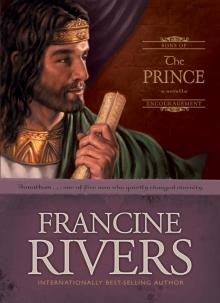 The Prince: Jonathan
The Prince: Jonathan Bridge to Haven
Bridge to Haven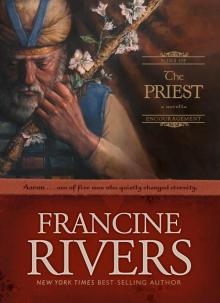 The Priest: Aaron
The Priest: Aaron Her Mother's Hope
Her Mother's Hope Redeeming Love
Redeeming Love The Scarlet Thread
The Scarlet Thread The Masterpiece
The Masterpiece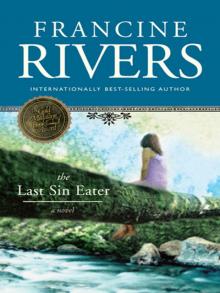 The Last Sin Eater
The Last Sin Eater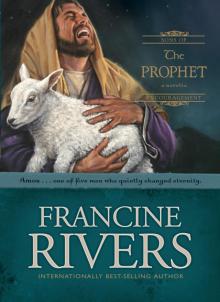 The Prophet: Amos
The Prophet: Amos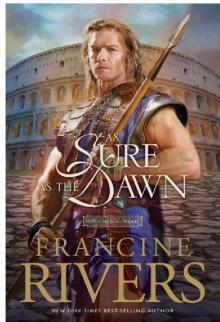 As Sure as the Dawn
As Sure as the Dawn Her Daughter's Dream
Her Daughter's Dream A Voice in the Wind
A Voice in the Wind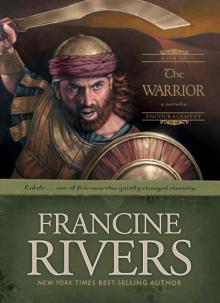 The Warrior: Caleb
The Warrior: Caleb The Scribe: Silas
The Scribe: Silas And the Shofar Blew
And the Shofar Blew The Atonement Child
The Atonement Child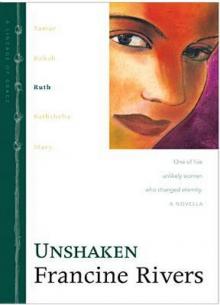 Unshaken_Ruth
Unshaken_Ruth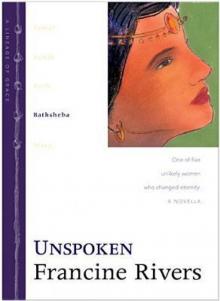 Unspoken_Bathsheba
Unspoken_Bathsheba The Scribe
The Scribe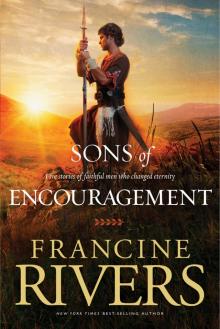 Sons of Encouragement
Sons of Encouragement The Shoe Box
The Shoe Box Sycamore Hill
Sycamore Hill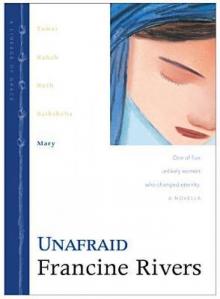 Unafraid_Mary
Unafraid_Mary Marta's Legacy Collection
Marta's Legacy Collection